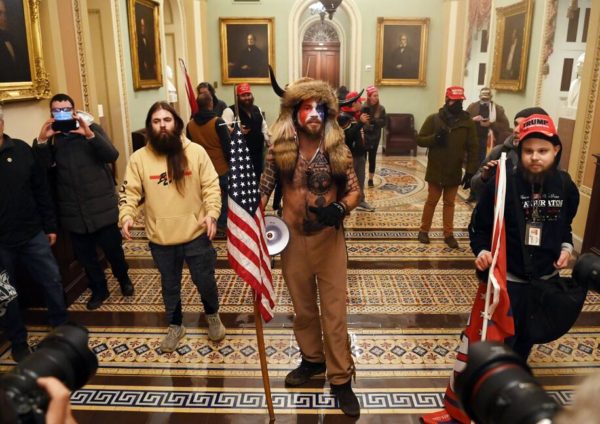1.30 Kathleen Parker in the Washington Post: Going forward, not only will House Republicans be associated with a colleague who “liked” a Twitter post calling for Speaker Nancy Pelosi’s murder. They’ll be attached to QAnon, which promotes the extraordinary fiction that Trump was leading a war against Satan-worshiping pedophiles and cannibals, whose leadership includes Hillary Clinton, Barack Obama, Oprah Winfrey, Tom Hanks and, oh, by the way, yours truly, as well as U2’s Bono. To those Republicans who can read: You own all of this. The party isn’t doomed; it’s dead. The chance to move away from Trumpism, toward a more respectful, civilized approach to governance that acknowledges the realities of a diverse nation and that doesn’t surrender to the clenched fist, has slipped away. What comes next is anybody’s guess. But anyone who doesn’t speak out against the myths and lies of fringe groups, domestic terrorists and demagogues such as Trump deserves only defeat — and a lengthy exile in infamy. Good riddance.
1.28 Felix Salmon on Axios: “The appeal of fables: The core GameStop story is a simple morality tale. A scrappy band of Wall Street outsiders, armed with little more than moxie and their stimulus checks, have not only made millions for themselves, but have also humbled big-name fund managerswho had dared to bet against a blameless retailer. Schadenfreude: Gabe Plotkin is a hedge-fund gazillionaire who just spent $44 million buying two adjoining properties in Miami Beach. He’s also famous for short-selling — for betting that companies will fail. If he and his ilk lose money, many people would feel happy. Lol nothing matters: The Reddit slogan “putting the FU in fundamentals” is perfectly calibrated to enrage investors who purport to care about things like valuation and price discovery. There’s nothing worse than losing a game to people who aren’t even taking it seriously. Shamelessness: The conspiracy to bid up GameShop stock took place in broad daylight, enraging old-time traders with a tendency to go on unhinged Twitter rants about “market manipulation”. (They never complained when Jim Cramer was doing it.) Eat my shorts: There’s a highly complex financial system underlying the GameStop rally, involving discount brokerages, payment for order flow, short sales, margin calls, delta hedging of call options, and much else. Lots of people bear longstanding grudges against some or all of that system, and are taking this opportunity to shout loudly about how the GameStop story proves that they’re right about… something. (Spoiler alert: 99% of the time, it doesn’t.)”
1.23 Tim Noah in The New Republic: “Even though Reagan’s disparagement of government failed to shrink its size, it did plenty of long-term damage. The tax cuts enacted to wage war on big government accelerated the trend toward income inequality without doing much to create economic growth. (A recent study by two economists at the London School of Economics reached the same conclusion about tax cuts enacted over the past five decades in other countries belonging to the Organization for Economic Cooperation and Development.) Growth in income inequality, in turn, fueled tribal disaffection among the white working class, which the GOP successfully exploited in presidential politics. . . . In calling for unity Wednesday, Biden was in effect saying, enough—not only with treasonous insurrection but also with the identification of government as the enemy. He didn’t say, “I’m for big government, and I’m going to make it bigger.” But he did say this: “We can right wrongs. We can put people to work in good jobs. We can teach our children in safe schools. We can overcome the deadly virus. We can reward work and rebuild the middle class and make health care secure for all. We can deliver racial justice, and we can make America once again the leading force for good in the world.”
1.22 Hank Aaron dies at 86. Jimmy Carter: “One of the greatest baseball players of all time, he has been a personal hero to us. A breaker of records and racial barriers, his remarkable legacy will continue to inspire countless athletes and admirers for generations to come.”

 1.21 David Graham in The Atlantic: Biden‘s speech “was well wrought, but it offered nothing unusual or surprising or especially memorable. Paradox- ically, that was the source of its power.”
1.21 David Graham in The Atlantic: Biden‘s speech “was well wrought, but it offered nothing unusual or surprising or especially memorable. Paradox- ically, that was the source of its power.”
1.20 Biden: “My whole soul is in it.”
1.20 Biden and Harris are sworn in, ending the Trump presidency. Biden: “Democracy has prevailed.”
1.19 McConnell: “The mob was fed lies. They were provoked by the President and other powerful people.”
1.19 Hannah Jones in the Times: “What does reuniting with people who are willing to overthrow our democracy in the service of holding on to white power [look like]? … How does one unify with them without actually being dismissive of the Black Americans whose votes are what caused all of this?”
1.16 Phil Spector dies at 81.
1.15 Fareed Zakaria in the Post: “The modern Republican Party has long harbored several factions that lived together uncomfortably — libertarians, evangelicals, states’ rights advocates and (let’s be frank) racists. They have been able to paper over the divides for decades. But in recent years, two factors have propelled the party into crisis. The first is that the Iraq War and the global financial crisis broke the back of the Republican establishment, opening the way for Trump, who appealed not to discredited party elites but to the base, with the help of raw cultural and racial rhetoric. The second factor has been the increasing awareness of its leaders that it is really not a majority party. In the past eight presidential elections, the Republican candidate for president has won the popular vote only once — in 2004, in the wake of 9/11 and the early days of the Iraq War — a trend unprecedented in U.S. history. Nonetheless, the electoral college and the Senate, along with gerrymandering and voter suppression, have enabled the party to win power without winning a majority. That has made it less responsive to the demands of the majority, national elites and the mainstream media. It has found a way to thrive by cultivating its own smaller ecosystem, creating its own facts, theories and heroes. But that ecosystem is splintering. Fox News, central to the party’s ability to indoctrinate its base with myths, half-truths and falsehoods, is losing market share. The newcomers — Newsmax and One America News — are willing to enter a fantasy world where even Fox News will not go. Perhaps most important, the Republican base is shrinking, not by a huge amount but significantly. Partly, this is a matter of long-term demographics; partly, it is Trump. Polls suggest that Trump’s approval rating has now descended into the 30s, with about 50 percent of independents supporting his removal from office. Republicans in swing districts across the country may find themselves in an impossible situation: unable to get nominated unless they embrace Trump but unable to get elected if they do. If these trends persist — a big “if” in a country where party loyalties remain very strong — we might see a dangerous dynamic. Some Republicans, both at the elite level as well as among ordinary voters, will defect from the party, unwilling to sign on to the Trump family cult. The rump Republican Party will become a minority party in more of the country. But it will be dominated by people who reject American democracy and are enamored of conspiracy theories, enraged by their powerlessness and increasingly willing to support extreme, even violent means to achieve their ends. In other words, the future Republicans in Congress may look a lot like the mob that stormed it last week.”
1.15 Greg Sargent in the Post: A scathing new report from the inspector general of the Justice Department on the Trump family separations policy exposes the startling depths of depravity and contempt for good governance and basic humanity that drove its implementation. The report found that the administration forged ahead with its “zero tolerance” policy — criminally prosecuting migrant families rather than releasing them into the interior pending asylum hearings — even though it knew this would “result in children being separated from families.” The administration did so despite being unprepared for what it was about to undertake, the report found, and with little concern for the profoundly traumatic effect it might ultimately have on thousands of children. The report also found that the administration didn’t have adequate systems in place to keep track of the children so families could be unified. It found officials were unconcerned and sometimes ignorant of legal requirements about how those children had to be treated. Importantly, the policy was implemented in such a haphazard, derelict fashion — and one so damaging to children — precisely in order to slake the desire of Trump and then-Attorney General Jeff Sessions to crack down on immigration in the most emphatic way possible.
 1.13 Governor tapes SOTS Speech 4
1.13 Governor tapes SOTS Speech 41.13 The House impeaches Trump. Ten Republicans join unanimous Democrats. Pelosi: “Today, in a bipartisan way, the House demonstrated that no one is above the law, not even the president of the United States, that Donald Trump is a clear and present danger to our country and that, once again, we honor that oath of office to protect and defend the Constitution of the United States, so help us God.” Rep. Liz Cheney: “There has never been a greater betrayal by a president.”
1.11 Bill Belichick: “Recently, I was offered the opportunity to receive the Presidential Medal of Freedom, which I was flattered by out of respect for what the honor represents and admiration for prior recipients. Subsequently, the tragic events of last week occurred and the decision has been made not to move forward with the award. Above all, I am an American citizen with great reverence for our nation’s values, freedom and democracy.I know I also represent my family and the New England Patriots team. One of the most rewarding things in my professional career took place in 2020 when, through the great leadership within our team, conversations about social justice, equality and human rights moved to the forefront and became actions. Continuing those efforts while remaining true to the people, team and country I love outweigh the benefits of any individual award.”
1.10 Arnold Schwarzenegger: “I grew up in Austria. I’m very aware of Kristallnacht, or the Night of Broken Glass. It was a night of rampage against the Jews in 1938 by the Nazi equivalent of the Proud Boys. Wednesday was the Day of Broken Glass right here in the United State. The broken glass was in the windows of the United States Capitol. But the mob did not just shatter the windows of the Capitol. They shattered the ideas we took for granted. They did not just break down the doors of the building that housed American democracy; they trampled the very principles in which our nation was founded. President Trump sought to overturn the results … of a fair election. He sought a coup by misleading people with lies. I know where such lies lead. President Trump is a failed leader. He will go down in history as the worst president ever. The good thing is he will soon be as irrelevant as an old tweet. A number of members of my own party, because of their own spinelessness … They’re complicit with those who carried the flag of self righteous insurrection into the Capitol. . . We need to heal, not just as Republicans or as Democrats, but as Americans. Now to begin this process, no matter what your political affiliation is, I ask you to join me in saying to President-elect Biden, ‘President-elect Biden, we wish you great success as our president. If you succeed, our nation succeeds. We support you with all our hearts as you seek to bring us together.’”
1.12 David Graham in The Atlantic: “[T]he rioters were imbued with the culture of impunity of the Trump era. This is a moment when bad behavior goes unpunished. The president has told his supporters that loyalty to his cause trumps fidelity to the law, and he has reinforced that message by handing out pardons to aides who get in trouble for putting him ahead of the law. The crowd he summoned to Capitol Hill on January 6 took that message to heart. Trump did not invent this culture of impunity. Even before he broke onto the political scene, officeholders from David Vitter to Bob Menendez to Chris Christie were realizing that when caught in a scandal, they didn’t have to resign, and could just brazen it out. But Trump elevated this move from a tactic to a virtue. His 2016 campaign exalted getting away with it, whatever it was: fleecing lenders, buying off politicians, grabbing women by the crotch. He encouraged violence against protesters at rallies, and even spoke of paying legal fees when someone punched a demonstrator. (Given his miserliness, it’s doubtful he followed through. Keeping promises, like following the rules, is for suckers.)”
1.12 Adam Serwer in The Atlantic: “They were business owners, CEOs, state legislators, police officers, active and retiredservice members, real-estate brokers, stay-at-home dads, and, I assume, some Proud Boys. The mob that breached the Capitol last week at President Donald Trump’s exhortation, hoping to overturn the results of the 2020 presidential election, was full of what you might call “respectable people.” They left dozens of Capitol Police officers injured, screamed “Hang Mike Pence!,” threatened to murder House Speaker Nancy Pelosi, and set up a gallows outside the building. Some were extremists using the crowd as cover, but as federal authorities issue indictments, a striking number of those they name appear to be regular Americans. And there’s nothing surprising about that. Although any crowd that size is bound to include people who are struggling financially, no one should be shocked to see the middle classes so well represented among the mob. The notion that political violence simply emerges out of economic desperation, rather than ideology, is comforting. But it’s false. Throughout American history, political violence has often been guided, initiated, and perpetrated by respectable people from educated middle- and upper-class backgrounds. The belief that only impoverished people engage in political violence—particularly right-wing political violence—is a misconception often cultivated by the very elites who benefit from that violence. The members of the mob that attacked the Capitol and beat a police officer to death last week were not desperate. They were there because they believed they had been unjustly stripped of their inviolable right to rule. They believed that not only because of the third-generation real-estate tycoon who incited them, but also because of the wealthy Ivy Leaguers who encouraged them to think that the election had been stolen. There’s ample precedent for this. When the Ku Klux Klan formed during Reconstruction, according to the historian Eric Foner, its leadership “included planters, merchants, lawyers, and even ministers. ‘The most respectable citizens are engaged in it,’ reported a Georgia Freedmen’s Bureau agent, ‘if there can be any respectability about such people.’”
1.9 Coach K.: “It was the sorriest day. I’m 73 years old. Outside of 9/11 and shootings at schools where kids have gotten shot and killed—by the way, I know everyone went under desks and that in the Capitol. I’d like to ask how many times teachers have had to do that at schools. Wednesday was a horrible day. It was an insurrection. It went to the very fabric of this great country, where the symbol for our democracy is that great Capitol. We allowed that symbol to be really just spit on and stepped on. It was a sorry day. My prayers go out to the officer’s family who was killed from the Capitol Police. Just like my prayers go out to the 16,000 families that have lost loved ones in this last week. Are you kidding me? There’s 16,000. What the hell are we doing? What the hell are we doing where we can’t work as a country to come together and get these vaccines out? If someone’s doing something bad, Congress has the responsibility of stepping forward. I’m not sure if you saw Colin Powell being interviewed on television—one of our great Americans. What he said was Congress needs to step forward and say, ‘You can’t do that.’ Where are our values? Our nation has been built on values. On values. It was a sorry, sorry day. Everyone who was involved—they should be prosecuted, and our leaders, our politicians who spoke up in support of that should be chastised. No question about it. And it’s not about being Republican or Democrat. It’s about being a damn American. Be Americans. Work together. Let’s get this thing back. People will say, ‘That’s not who we are.’ That is who we are right now. It is who we are. We need to change who we are. We need to get back to basic principles that have founded this country. Being home and watching that, my West Point background, being in the Army and all that. I’m used to being on a team. Our country needs to be a team again.”
1.9 David W. Blight in the Times: “One hundred and fifty years after the emergence of the Confederate Lost Cause ideology, a new Lost Cause invaded the U.S. Capitol with the incitement of the president of the United States. Waving American, Confederate, Gadsden and, especially, Trump flags, Donald Trump’s loyalists desecrated the greatest symbolic edifice of America. Trumpism has already become a lethal Lost Cause. It does not quite have martyrs and a cult of the fallen in which to root its hopes and dreams. But it does have a self-destructive cult leader about to leave power in a defeat that has been transformed into a narrative of betrayal, resistance and a promise of political revitalization. The important Lost Causes in history have all been at heart compelling stories about noble defeats that were, with time, forged into political movements of renewal: the French after the Franco-Prussian War of 1870-71 and the profound need for national revanche; Germany after the Great War and its “stab in the back” theory that led over the 1920s to the rise of the nationalism and racism of the Nazis; and the white South after our Civil War. All Lost Causes find their lifeblood in lies, big and small, lies born of beliefs in search of a history that can be forged into a story and mobilize masses of people to act politically, violently, and in the name of ideology. The story demands a religious loyalty. It must be protected, reinforced, practiced in ritual and infused with symbols. What is the Trumpian claim of a stolen election but an elaborate fiction that fights to make the reality and truth of the unbelievers irrelevant. Some myths are benign as cultural markers; but others are rooted in big lies so strong as engines of resentment that they can fill parade grounds and endless political rallies, or motivate the storming of the U.S. Capitol in a quixotic attempt to overthrow an election. Mr. Trump’s Lost Cause takes its fuel from conspiratorial myths of all kinds, rehearsed for years on Trump media and social media platforms. Its guiding theories include: Christianity under duress and attack; large corrupt cities full of Black and brown people manipulated by liberal elites; Barack Obama as alien; a socialist movement determined to tax you into subservience to “big government”; liberal media out to crush family and conservative values; universities and schools teaching the young a history that hates America; resentment of nonwhite immigrants who threaten a particular national vision; and whatever hideous new version of a civil religion QAnon represents. An effective, enduring Lost Cause story needs to know clearly what it hates, has to attain widespread control of its own communication and needs institutional rooting, and it must explain almost everything. It converts loss and longstanding grievance into community, and promises of victory on altars of strife. The Confederate Lost Cause is one of the most deeply ingrained mythologies in American history. It emerged first as a mood of traumatized defeat in the 1860s, but grew into an array of arguments, organizations and rituals in search of a story that could win hearts and minds and regain power in the Southern states. It was initially a psychological response to the trauma of collective loss among former Confederates. It gained traction in violent groups such as the Ku Klux Klan and in the re-emergence of the Democratic Party’s resistance to Reconstruction. It assumed the character of a religious movement in endless sermons about the noble fallen soldiers who defended home, hearth, their women and their God. It maintained that the best cause in a war can lose nobly if overwhelmed by industrial might and other evil forces of modernity. A lasting civil religion requires a saint, and the South quickly created one out of the life of Robert E. Lee, the Confederacy’s leading general who fought to the bitter end, but died in 1870, before he could discourage the ubiquitous mythmaking and monument building in his honor. Crucially, the Lost Cause argued that the Confederacy never fought to preserve slavery, and that it was never truly defeated on battlefields. Lost Cause spokesmen saw the Confederacy as the true heir of the American Revolution, and maintained that loss by the underdog could transform into a success story even for Yankees in need of security and patriotic sentiment in an age of anxiety over rapid urbanization, immigration and strife between labor and capital. Above all, the Lost Cause seductively reminded white Americans that the Confederacy had stood for a civilization in which both races thrived in their natural capacities, a regime of proper racial and gender order. The slaughter of the Civil War had destroyed that order, but it could be remade and the whole nation, defined as white Anglo-Saxon, could yet be revived. By the 1890s, the Lost Cause was no longer a story of loss, but one of victory: the defeat of Reconstruction. Southerners — whether run-of-the-mill local politicians, famous former generals or women who forged the culture of monument building — portrayed white supremacy and home rule for the South as the nation’s victory over radicalism and Negro rule. Reconstruction in the 1860s, forged in the three great constitutional amendments (13th, 14th and 15th), had been overthrown to the glory of America. The Trumpian Lost Cause has quite different origins, of course. It does not derive from sacrifice of blood and treasure in war. On its face it is not a response to the military conquest of a society. But it does seem to be tonic for those who fear long-term social change; it is a story in search of revival and order. Trumpism knows what it hates: liberalism; taxation; what it perceives as big government; nonwhite immigrants who drain the homeland’s resources; government regulation imposed on individuals and businesses; foreign entanglements and wars that require America to be too generous to strange peoples in faraway places; any hint of gun control; feminism in high places; the nation’s inevitable ethnic and racial pluralism; and the infinite array of practices or ideas it calls “political correctness.” Potent ideas all in search of a history. Trumpists want something permanent and stable: border walls; ever-growing stock portfolios; access to the environment and hunting land without limits; coal they can burn at will; the “liberty” to reject masks; history that tastes of the sweetness of progress and not the bitterness of national sins. In his book “The End of the Myth: From the Frontier to the Border Wall in the Mind of America,” the historian Greg Grandin describes how a growing sense of alienation, grievance and inequality led millions of largely white Americans to embrace the simple but clear story Mr. Trump told them. From more than a decade of angry right-wing attacks on all things Obama, Democratic Party and liberal, they were primed for “a conspiratorial nihilism, rejecting reason and dreading change” as they tuned in to Rush Limbaugh, watched Fox News and strolled down the internet rabbit hole to Q.”
1.8 Wall Street Journal: “This was an assault on the constitutional process of transferring power after an election. It was also an assault on the legislature from an executive sworn to uphold the laws of the United States. This goes beyond merely refusing to concede defeat. In our view it crosses a constitutional line that Mr. Trump hasn’t previously crossed. It is impeachable.”
1.8 Sen. Chris Murphy: “Taxpayers deserve to know why were unable to defend the capitol from attack, why it took only an hour for a handful of ragamuffin, half-armed protesters to enter the building and pose a grave threat to the continuity of democracy.”
1.8 Pelosi calls on Trump to resign or face impeachment.
1.7 Barr: “Orchestrating a mob to pressure Congress is inexcusable. The President’s conduct yesterday was a betrayal of his office and supporters.”
1.7 Schumer calls on Pence to invoke the 25th amendment.
 1.6 Kansas City Star: “Sen. Josh Hawley has blood on his hands.”
1.6 Kansas City Star: “Sen. Josh Hawley has blood on his hands.”
1.6 After Order is restored, Congress labors through the night, finally ratifying Biden’s election at 4 AM. Graham: “All I can say is a count me out. Enough is enough. I’ve tried to be helpful, but when this Wisconsin Supreme Court ruled four to three, that they didn’t violate the constitution of Wisconsin, I agree with the three, but I accept the four. If Al Gore could accept five-four he’s not president, I can accept Wisconsin four to three. Pennsylvania. It went to the Second Circuit. So much for all the judges being in Trump’s pocket. They said, “No, you’re wrong.” I accept the Pennsylvania Second Circuit that Trump’s lawsuit wasn’t right. Georgia, they said the secretary of state took the law into his own hands. He changed the election laws unlawfully. A federal judge said no. I accept the federal judge, even though I don’t agree with it. Fraud. They said there’s 66,000 people in Georgia under 18 voted. How many people believe that? I asked, “Give me 10,” and had one. They said 8,000 felons in prison in Arizona voted. Give me 10. I got one. Does that say there’s … There’s problems in every election. I don’t buy this. Enough’s enough. We’ve got to end it.” Rep. Conor Lamb: “That attack today — it didn’t materialize out of nowhere. It was inspired by lies — the same lies that you’re hearing in this room tonight. And the members who are repeating those lies should be ashamed of themselves. Their constituents should be ashamed of them.”

 1.6 Four die in the melee; two days later, a Capitol police officer also dies from wounds received.
1.6 Four die in the melee; two days later, a Capitol police officer also dies from wounds received.
1.6 Mobs storm the Capitol, forcing Congress to to end proceedings and seek refuge. Security officers barricade the House chamber and draw guns to protect representatives
1.6 Trump incites followers to disruptions. “All of us here today do not want to see our election victory stolen by emboldened radical-left Democrats,  which is what they’re doing, and stolen by the fake news media. That’s what they’ve done and what they’re doing. We will never give up. We will never concede. It doesn’t happen. You don’t concede with these steps involved.” Also, “Because you’ll never take back our country with weakness. You have to show strength and you have to be strong. We have come to demand that Congress do the right thing And only count the electors who have been lawfully slated, lawfully slated. I know that everyone here will soon be marching over to the Capitol building to peacefully and patriotically make your voices heard.” Giuliani calls for “trial by combat.” Senators Hawley and Cruz cast doubt on the legitimacy of the vote, as Congress meets to count the votes of the Electoral College, McConnell: “President Trump claims this election was stolen. The assertions range from specific local allegations to constitutional arguments to sweeping conspiracy theories. I supported the President’s right to use the legal system. Dozens of lawsuits received hearings in courtrooms across the country. But over and over, the courts rejected these claims — including all-star judges whom the President himself nominated. Every election features some illegality and irregularity and it’s unacceptable. I support strong state-led voting reforms. Last year’s bizarre pandemic procedures must not become the new norm. But nothing before us proves illegality anywhere near the massive scale that would have tipped this entire election. Nor can public doubt alone justify a radical break when that doubt was incited without evidence. The Constitution gives Congress a limited role. We cannot simply declare ourselves a national Board of Elections on steroids.”
which is what they’re doing, and stolen by the fake news media. That’s what they’ve done and what they’re doing. We will never give up. We will never concede. It doesn’t happen. You don’t concede with these steps involved.” Also, “Because you’ll never take back our country with weakness. You have to show strength and you have to be strong. We have come to demand that Congress do the right thing And only count the electors who have been lawfully slated, lawfully slated. I know that everyone here will soon be marching over to the Capitol building to peacefully and patriotically make your voices heard.” Giuliani calls for “trial by combat.” Senators Hawley and Cruz cast doubt on the legitimacy of the vote, as Congress meets to count the votes of the Electoral College, McConnell: “President Trump claims this election was stolen. The assertions range from specific local allegations to constitutional arguments to sweeping conspiracy theories. I supported the President’s right to use the legal system. Dozens of lawsuits received hearings in courtrooms across the country. But over and over, the courts rejected these claims — including all-star judges whom the President himself nominated. Every election features some illegality and irregularity and it’s unacceptable. I support strong state-led voting reforms. Last year’s bizarre pandemic procedures must not become the new norm. But nothing before us proves illegality anywhere near the massive scale that would have tipped this entire election. Nor can public doubt alone justify a radical break when that doubt was incited without evidence. The Constitution gives Congress a limited role. We cannot simply declare ourselves a national Board of Elections on steroids.”
1.6 Rahm Emanuel to Axios: * “The successful presidents understand the power of public opinion to change Washington, rather than Washington’s ability to change public opinion.” * “Whenever you are working it, you’ve got to know where people are starting from, and don’t dismiss their politics as wrong. Try and incorporate their politics in your strategy.” * “There are different power centers, and the media is its own institutional power, whether they like it or not.” * “You need to know if you’re moving the ball down the field or stopping the ball. The first is harder, by degrees.” * “You have all of your administration, not just what’s at 1600 Pennsylvania Avenue, but to wield that power is to have people know that you control it.”
1.5 Beating the odds, Ossoff and Warnock win special elections in Georgia, and give Democrats control of the Senate.
1.5 Andrew Brandt in SI: “Whatever the background, I would look for someone with the ultimate leadership skill: getting people to do things they don’t necessarily want to do, and do them with pride. I would look for someone who understands it is not what you say to people; rather, it is how you make them feel.”
1.5 George Will in the Washington Post: “For many years, some people insisted that a vast conspiracy, not a lone gunman, masterminded the 1963 assassination of President John F. Kennedy near the grassy knoll in Dallas’s Dealey Plaza. To these people, the complete absence of evidence proved the conspiracy’s sophistication. They were demented. Today’s senatorial Grassy Knollers — Hawley, with Cruz and others panting to catch up — are worse. They know that every one of the almost 60 Trump challenges to the election have been rebuffed in state and federal courts, including the Supreme Court, involving more than 90 judges, nominated by presidents of both parties. But for scores of millions of mesmerized Trump Republicans, who think the absence of evidence is the most sinister evidence, this proves that the courts, too, are tentacles of the ‘deep state.’ Hawley and Cruz, both of whom clerked for chief justices of the Supreme Court, hope to be wafted into the White House by gusts of such paranoia.”
 1.4 In the engine room of SOTS
1.4 In the engine room of SOTS
1.4 Trump: “I have to tell you, I hope that our great vice president, our great vice president, comes through for us. He’s a great guy. Because if he doesn’t come through, I won’t like him quite as much.”
1.3 David Von Drehle in the Washington Post: “Like gum on the nation’s shoe, 2020 looks determined to stick around,” with the pandemic poised to get worse before it gets better, the stock market “as fizzy as cheap champagne,” and President Trump still, well, Trumping around, for a few more weeks anyway. Still, Von Drehle finds grounds for optimism without succumbing to naivete. “Now we will start getting the better of the virus, thanks to innovative vaccines developed in record time,” he writes. “Underlying strengths of the United States — the human capital from around the world, the infrastructure of research, the global friendships — will turn the tide in coming months. We need only a sense of urgency and a faith in math.”
1.3 Molly Roberts in the Post: “The finale of 2020 — finally — tempts us into a perennial paradox. The year should teach us the lesson that things not only always can but also usually will get worse. Yet many of us can’t help but believe they won’t possibly get worse than this. Which means that, as we count down to midnight, we find ourselves in a familiar contradiction: the most miserable of optimists.”
1.2 In an hour-long phone call, Trump pressured Georgia Secretary of State Brad Raffensperger to recalculate the state’s tally of presidential election votes to overturn President-elect Joe Biden’s win. Pushing baseless conspiracy theories about voter fraud, Trump told Raffensperger that Georgians are “angry” with the election results. “We have won this election in Georgia,” Trump falsely claimed during the call. “And there’s nothing wrong with saying that, Brad. You know, I mean, having the correct ― the people of Georgia are angry. … And there’s nothing wrong with saying that, you know, that you’ve recalculated.” Raffensperger can be heard pushing back on Trump’s request, telling the president that the data he used to back up his claims are “wrong.” Perhaps violating state and federal law, Trump said “All I want to do is this: I just want to find 11,780 votes, which is one more than we have, because we won the state.” Carl Bernstein: “This is worse than Watergate.”
